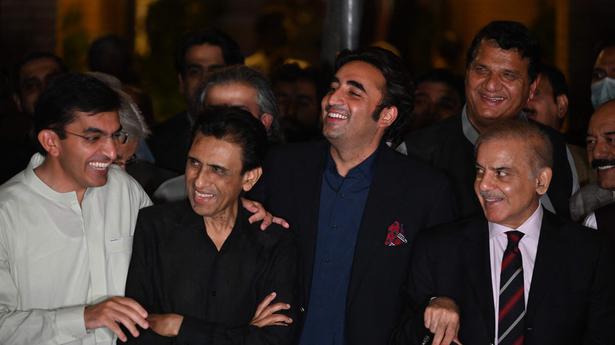
Pakistan political crisis | The main entities who fueled the ouster of Imran Khan
The Hindu
The Pakistan Opposition has nominated Shehbaz Sharif to succeed the outgoing Prime Minister Imran Khan
After multiple adjournments of Pakistan’s National Assembly in a bid by Imran Khan to evade the no-trust vote tabled by the Opposition, the intervention of the Supreme Court, and eventually, a series of high-intensity political developments in the early hours of April 10, led to the ouster of Pakistan’s Tehreek-e-Insaf (PTI) leader and the country’s embattled Prime Minister Imran Khan.
The overnight exit of the former captain of Pakistan’s cricket team, however, had been several months in the making, fueled by a group of political entities aiming to dislodge him and a couple of favourable events that emboldened their ambition.
The outgoing Prime Minister’s administration was described as a ‘hybrid-regime’ between Mr. Khan’s PTI-led coalition and the Pakistan Army, or ‘the establishment’. It was the backing of Pakistan’s Army chief General Qamar Javed Bajwa and the former head of the country’s intelligence agency ISI, Lt. Gen Faiz Hameed, that reportedly played a pivotal role in Mr. Khan taking and retaining charge.
However, last year, General Bajwa and the military started being criticised by the Opposition for lending their support to Mr. Khan. Political observers have said that the army's frustrations were also rooted in the fact that the PTI leader had failed in bringing stable governance, especially in the crucial Punjab province where he refused to replace Usman Buzdar as the Chief Minister despite strong dissatisfaction.
The growing rift between Gen Bajwa and Mr. Khan became most evident in October last year, when the former wanted to appoint a new head for the ISI. The army chief wanted to replace Lt. Gen Faiz Hameed, who had reportedly become increasingly confident of succeeding Gen Bajwa as the next military head. Mr. Khan, who had reportedly developed a close bond with Lt Gen Hameed, did not sign the notification for the new appointee, Lt. Gen Nadeem Anjum, for three weeks, until finally relenting.
Lastly, the army did not agree with Mr. Khan on some crucial foreign policy decisions. Mr. Khan’s failed attempts to get the attention of the United States after it withdrew from Afghanistan was one of the reasons. As far as relations with India are concerned, Mr. Khan was not keen on General Bajwa’s public attempts to stabilise relations with India and restore trade.
Shehbaz Sharif, the leader of the Opposition in the Pakistan National Assembly and the brother of three-time Prime Minister Nawaz Sharif, has been nominated by the Opposition as Mr. Khan’s successor.











